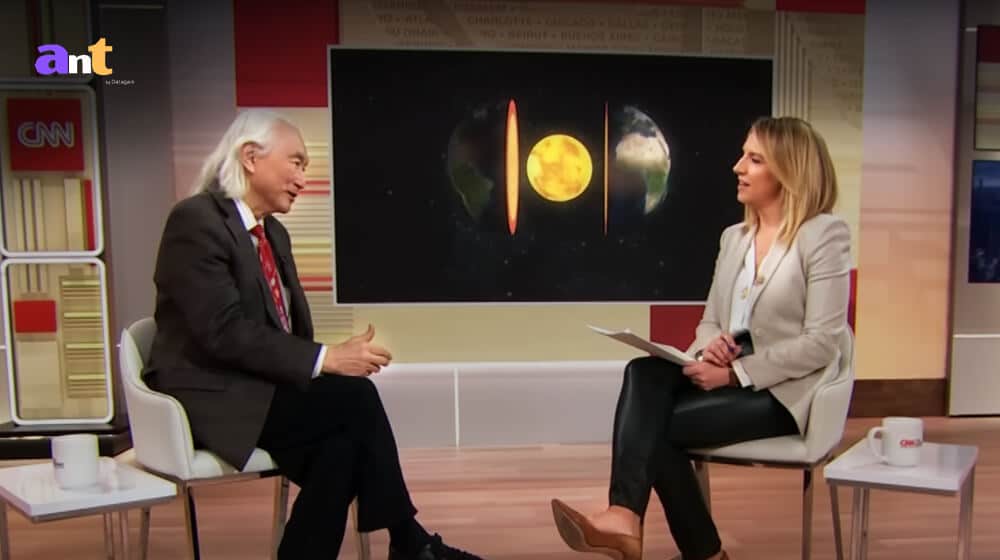
Home » Transcript Library » Professor breaks down why Earth’s inner core may have stopped transcript
Professor breaks down why Earth’s inner core may have stopped transcript
News Anchor 00:00:00
Well, this morning, we are learning about a shift in the earth’s inner core. That sounds like the plot of a Hollywood blockbuster. Scientists say our planet’s solid core which is actually disconnected from the rest of the earth’s layers may actually have stopped rotating and could even reverse course. This is a new study that was published on Monday in the journal Nature Geoscience and its authors, who are based in Beijing, took a very close look at the seismic waves from earthquakes that have passed through our planet’s course since the 1960s. And that is how they were able to calculate the speed at which the inner core is spinning. Are you confused? I am. We’re going to get to understand this a little bit better with our guest. Let’s bring in Michio Kaku. He’s a professor of theoretical physics at the City University of New York. Professor, good morning. Thank you.
Michio Kaku 00:00:43
Good morning. Glad to be on.
News Anchor 00:00:44
What does this mean?
Michio Kaku 00:00:45
Well, at first it sounds like something from a Hollywood movie.
News Anchor 00:00:49
Right.
Michio Kaku 00:00:49
The script says oh my God, the core of the earth is spinning backwards. I mean this is worse than having a tsunami or an earthquake. The stability of what you walk on is at stake. Now, this report comes not from Hollywood, it comes from reputable scientists at Beijing University that analyze echoes. When an earthquake takes place, shock waves go reverberating around the inside of the earth. And by analyzing these echoes with computers, you can recreate a model of the inside of the earth. And sure enough, the core seems to be about to spin backwards.
News Anchor 00:01:23
Okay. But I read that this happens every 70 years, so we don’t need to be alarmed?
Michio Kaku 00:01:29
That’s right. The bad news is that we know very little about the core of the earth, very little about what’s underneath our feet. The good news is probably there’s nothing to worry about in the sense that roughly every 70 years or so, we’re not sure the center of the earth does seem to go backwards. If this is the core — this is the crust of the earth that we live on.
News Anchor 00:01:50
Yes.
News Anchor 00:01:57
So the part we’re on never moves in reverse.
Michio Kaku 00:01:59
Yeah. So the core of the earth sits in a pool of molasses and it’s able to spin independently of the crust of the earth. So in other words, don’t lose any sleep over this. Probably it’s a natural cycle. It takes place probably once every 70 years or so. But we need more data because this is new territory for us.
News Anchor 00:02:21
Yes. Why do we need to know? I mean, they spent a lot of time, they studied earthquakes back to the 60s. Why is it important to know more about this? What are the implications?
Michio Kaku 00:02:28
The implications are potentially enormous, because think of continental drift. Why are the continents moving away from each other? What is driving it? And also earthquakes, the whole nature of the stability of the planet itself. We know very little about what’s underneath our feet. And that’s why this information from echoes, computer analyze is very important because it tells us the future of the earth.
News Anchor 00:02:55
What questions finally, professor, does this leave you with?
Michio Kaku 00:02:59
Well, it leaves me with the frustration that it’s under our feet. It’s just you can almost touch it, but it is thousands of miles distance and we really don’t know that much about our home. We know more about other planets than we do about the center of the earth.
News Anchor 00:03:15
Oh, that’s so interesting.
Michio Kaku 00:03:16
Like Mars, for example, is probably frozen over, not much earthquake activity at all. So we know a fair amount about Mars, we know very little about the earth because the earth is dynamic. Things are moving and churning at the center of the earth. That’s why we have earthquakes. That’s why we have continental drift and volcanoes.
News Anchor 00:03:34
Yeah, volcanoes. My son’s favorite thing, he likes to make them with baking soda and vinegar in the kitchen. Thank you, professor. I now understand it much better. We appreciate it.
Copyright Disclaimer
Under Title 17 U.S.C. Section 107, allowance is made for “fair use” for purposes such as criticism, comment, news reporting, teaching, scholarship, and research. Fair use is permitted by copyright statute that might otherwise be infringing.






